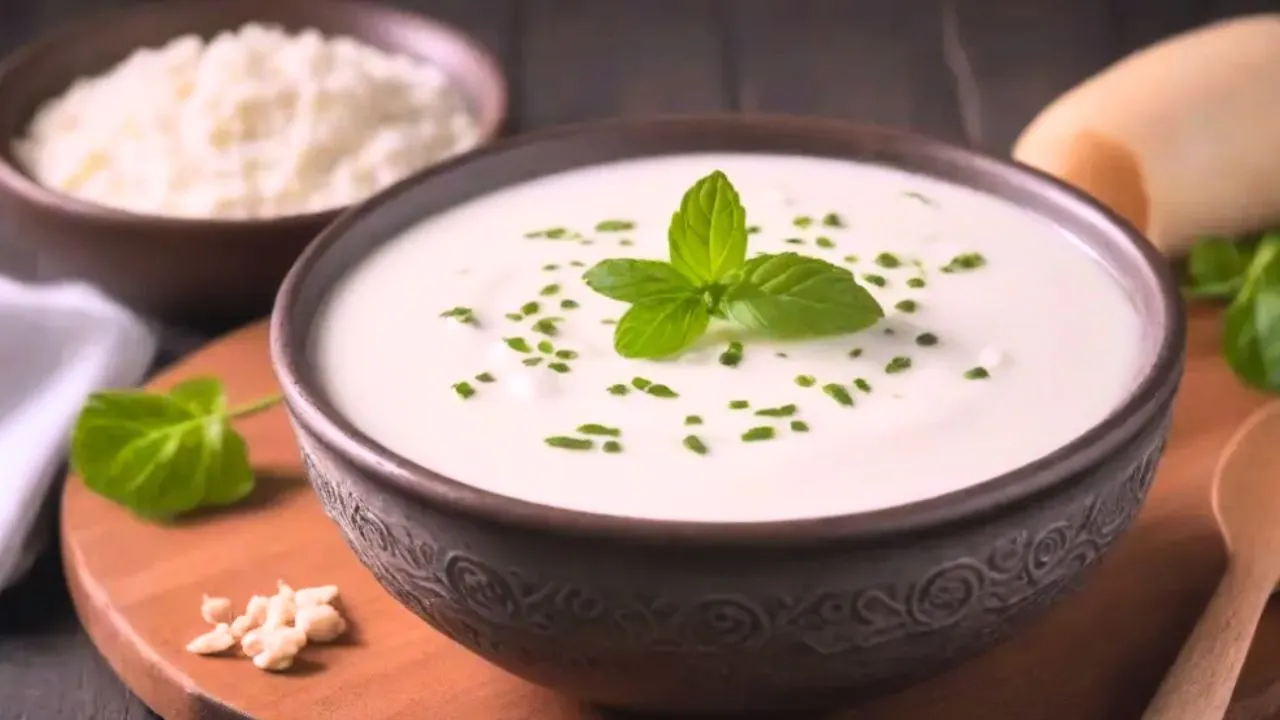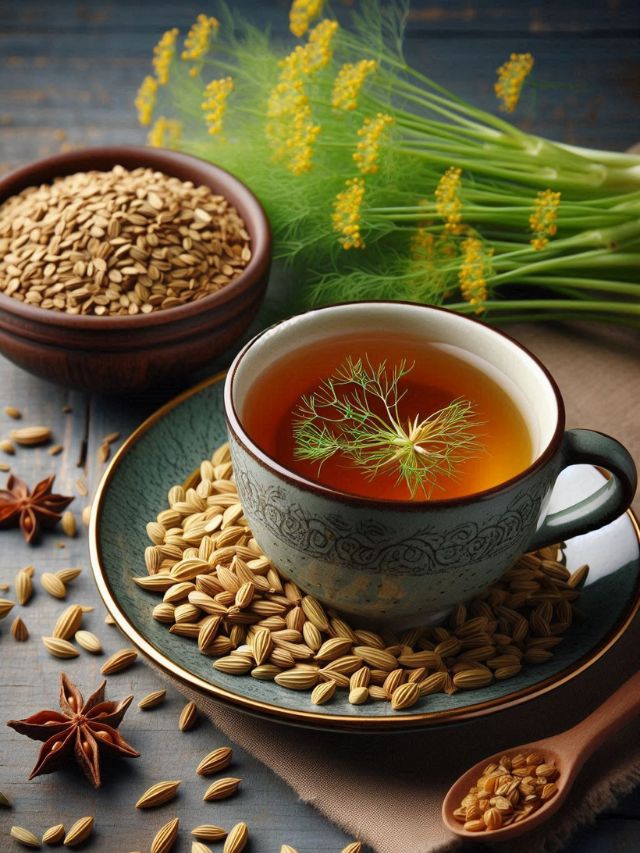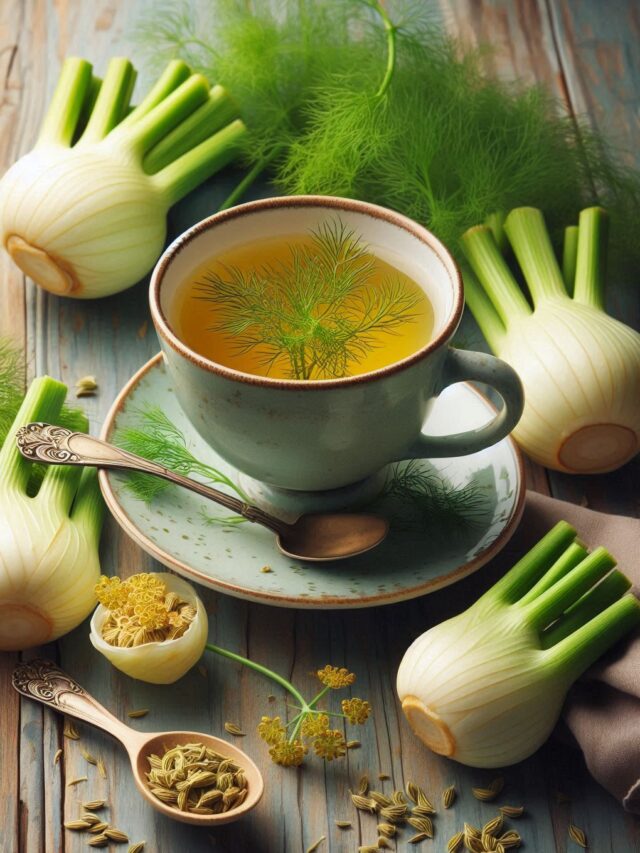Raita is a popular side dish in Indian cuisine that is enjoyed with various dishes. Made with yogurt or curd, vegetables, and spices, raita is a refreshing accompaniment that complements the main course. Can we eat raita at night? according to Ayurveda, the traditional Indian system of medicine, consuming raita or Curd at night can have adverse effects on your digestion and overall health, which we discuss in this article.
Ayurveda believes that food plays a significant role in maintaining a person’s health and well-being. It emphasizes the importance of consuming the right type of food in the right amount, at the right time. Ayurveda also recognizes that each person’s body type is unique, and therefore, the diet should be tailored accordingly.
Let’s explore why Ayurveda advises against eating raita at night and How its effects on the body.
Each person born with the five elements i.e. Earth, Air, Water, Fire, and Space. we possess a unique balance between these five elements in varying degrees. Ayurveda Says that Our body has a three Doshas i.e. Vata, Pitta, and Kapha. We have to balance these Doshas for good health, let’s know why we don’t have to eat raita or Curd at night.
Can We Eat Raita at Night?
No, According to Ayurveda Eating Raita or Curd at night increases Kapha Dosha in the body, which leads to excess mucus development in the nasal passage and we can understand with the following points:-
Digestion Process at Night
According to Ayurveda, our digestive system follows a circadian rhythm, which means it functions differently at different times of the day. During the day, our digestive system is active, and the body can process food efficiently. In contrast, during the night, our digestive system slows down, and the body focuses on repairing and rejuvenating itself.
Eating heavy or difficult-to-digest foods at night can disrupt this process and lead to various digestive problems. Raita, although a light and refreshing side dish, contains yogurt, which can be difficult to digest, especially at night.
Cooling Properties of Raita
Raita is a cooling food that can reduce body heat and acidity. It is often consumed with spicy and hot dishes to balance the heat and provide relief. However, according to Ayurveda, consuming cooling foods at night can interfere with the body’s natural process of warming up before sleep.
When we sleep, our body’s metabolism slows down, and our internal organs need warmth to function optimally. Consuming cooling foods at night can disrupt this process and lead to various health problems, such as cold, cough, and respiratory infections.
Effect on Doshas
Ayurveda recognizes three doshas, or biological energies, that govern the body’s functions. These doshas are Vata, Pitta, and Kapha, and each person has a unique combination of these doshas. Eating foods that are not suitable for your dosha can cause imbalances and lead to health problems.
Raita is a cooling food that can aggravate the Kapha dosha, which governs mucus and phlegm in the body. Consuming raita at night can lead to an increase in Kapha dosha, leading to mucus buildup and respiratory problems.
Negative Effects on Sleep
Consuming heavy or difficult-to-digest foods at night can also affect the quality of sleep. When the body is busy digesting food, it can interfere with the body’s natural sleep cycle and lead to restless sleep, insomnia, or other sleep disorders.
Raita, although a light side dish, can still affect the quality of sleep if consumed at night. The cooling properties of raita can interfere with the body’s natural process of warming up before sleep, leading to difficulty falling asleep or staying asleep.
What is the Best Time to Have Curd or Raita?
The best time to eat Raita or Curd is in the morning at breakfast and afternoon at lunch, as it increases Kaph Doshas which leads to excess mucus production in the respiratory system, you should avoid having it at night.
What are the Benefits of Raita or Curd?
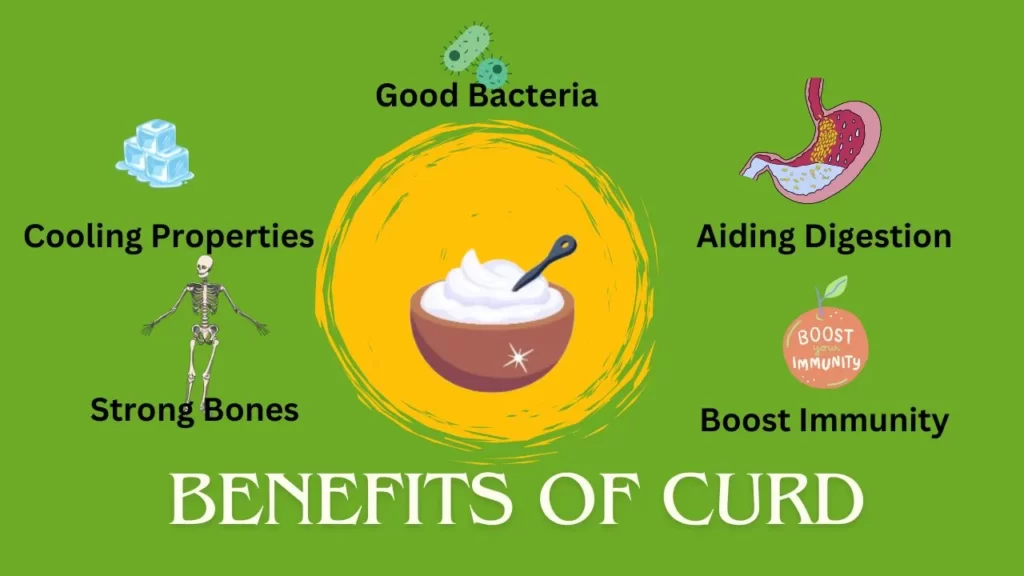
Raita and curd, both dairy products, have numerous health benefits:
Benefits of Raita:
- Probiotic: The yogurt in raita is a known probiotic, promoting the growth of good bacteria, improving gut health, and aiding the digestive process.
- Nutrient-rich: Raita is a nutrient-dense food, that provides high-quality protein, vitamins, and minerals.
- Hydration: Raita, especially bottled gourd (lauki or ghia) raita, can help prevent constipation due to its water and dietary fiber content.
Benefits of Curd:
- Digestion and Immunity: Curd improves digestion, provides stronger immunity, and is a great probiotic, helping boost your immune system function.
- Nutrient-rich: Curd is rich in essential nutrients like calcium, vitamin B-2, vitamin B-12, potassium, and magnesium.
- Skin Health: Consumption of curd helps in keeping the skin moisturized.
- Blood Pressure: The special proteins in curd along with nutrients like potassium and magnesium help in lowering high blood pressure.
- Bone Health: Curd is rich in calcium, phosphorus, and vitamin D, essential nutrients for bone health.
Remember, while raita and curd have many health benefits, it’s important to consume them as part of a balanced diet. If you have specific dietary restrictions or health conditions, it’s always a good idea to consult with a healthcare professional before making significant changes to your diet.
Nutritional Values of Curd
Below is a basic table of the nutritional values of curd (per 100 grams). Keep in mind that these values can vary based on the specific brand and preparation method.
| Nutrient | Amount per 100g |
|---|---|
| Calories | 61 kcal |
| Protein | 3.4 g |
| Total Fat | 3.3 g |
| Saturated Fat | 2.1 g |
| Cholesterol | 14 mg |
| Carbohydrates | 4.7 g |
| Sugars | 4.7 g |
| Dietary Fiber | 0.0 g |
| Calcium | 121 mg |
| Phosphorus | 85 mg |
| Potassium | 155 mg |
| Sodium | 36 mg |
| Vitamin A | 97 IU |
| Vitamin C | 0.5 mg |
| Vitamin D | 0.4 µg |
| Vitamin B12 | 0.5 µg |
| Magnesium | 11 mg |
| Zinc | 0.4 mg |
Please note that these values are approximate and can vary based on the specific product and preparation methods. Always check the nutrition label for accurate information.
How to get the Maximum benefits of Curd(dahi) or Raita.
To get the maximum benefits of Curd you should make it at home, if you don’t have the option to make it at home then buy from a trusted source and avoid having flavored yogurt or Curd as it has added sugar and artificial flavors that might not be good for your health.
Who Should Avoid to Eat Raita or Curd (Dahi)?
While raita and curd are generally healthy, there are certain conditions under which their consumption should be limited or avoided:
Raita:
Raita is typically made with curd, so the same precautions apply to it as to curd.
Curd:
- Lactose Intolerance or Dairy Allergy: People who are lactose intolerant or allergic to dairy products should avoid curd.
- Obesity: Curd is high in fat and can contribute to weight gain, so it may be best avoided by people with obesity.
- Kapha Disorders: In Ayurveda, curd is said to increase Kapha, so people with Kapha disorders may want to avoid it.
- Bleeding Disorders and Inflammatory Conditions: Curd may exacerbate these conditions.
- Kidney Problems or High Cholesterol Levels: These individuals should consume curd in moderation.
- Respiratory Diseases: Curd has mucus-encouraging properties, so it should not be consumed at night by asthmatics, cough and cold sufferers, and people with other respiratory diseases.
- Weak Digestive Systems: Curd is not recommended for people who have weak digestive systems.
- Arthritis: As curd is a sour food, people with arthritis should not consume it regularly due to the fact that sour foods are known to accelerate joint pain.
Additionally, curd should not be heated as it loses its properties due to heating. It should consumed in moderate quantity. It should not be mixed with fruits as it is a channel blocker incompatible with food. Curd is incompatible with meat and fish.
Read more: Cleansing Your Liver Naturally | What are the Natural Remedy For Liver
FAQs
Can I consume raita during the day?
Yes, consuming raita during the day is considered healthy
What are some alternative side dishes to consume at night?
Ayurveda recommends consuming warm and easy-to-digest foods at night. Some suitable side dishes include lightly cooked vegetables, soups, and lentil dishes.
Can consuming raita at night affect weight loss?
Yes, consuming difficult-to-digest foods at night can affect weight loss. The body’s metabolism slows down during sleep, and consuming heavy foods can lead to weight gain.
Can we take raita for dinner?
You should avoid it for dinner, as taking raita for dinner may create discomfort in your digestion as at night metabolism at it lowest position
Conclusion
In conclusion, Ayurveda recommends consuming light and easy-to-digest foods at night to maintain a healthy digestive system and overall well-being. Raita, although a refreshing and healthy side dish, contains yogurt, which can be difficult to digest, especially at night. Consuming cooling foods at night can interfere with the body’s natural process of warming up before sleep, leading to various health problems.
It’s essential to understand your body type and the foods that suit you best to maintain optimal health. As the saying goes, “You are what you eat,” and by consuming the right type of food at the right time, you can lead a healthy and fulfilling life. So next time you’re considering consuming raita at night, think twice and consider Ayurveda’s perspective on the matter.
(Disclaimer: The information provided here is for educational and informational purposes only. It is not intended to be a substitute for professional medical advice, diagnosis, or treatment.)
More from Ayurveda Sci:
